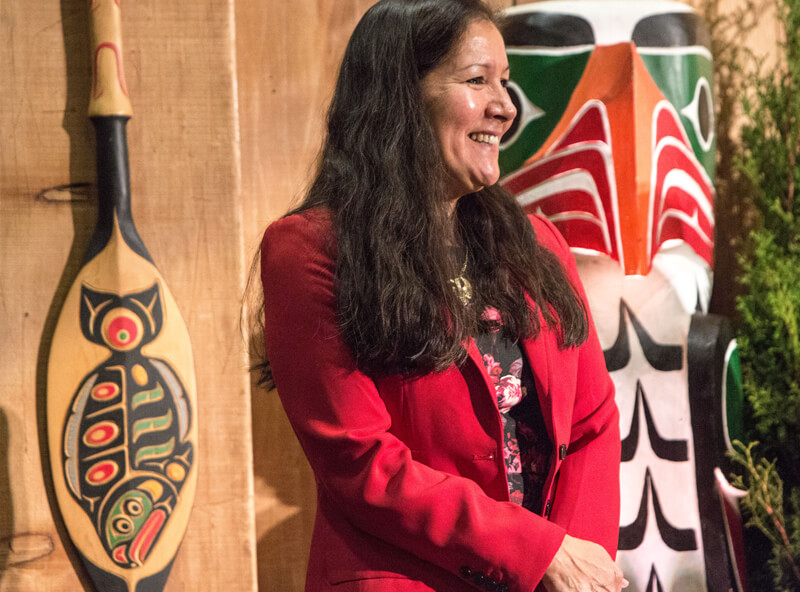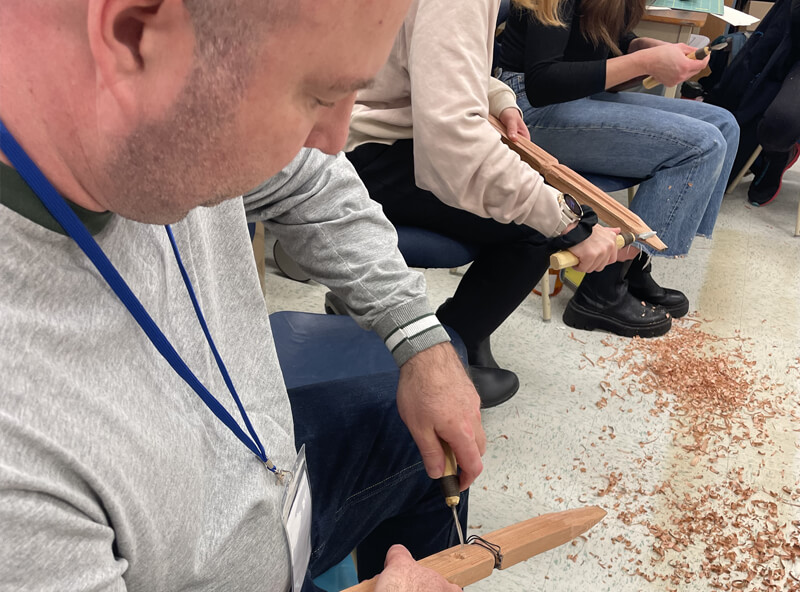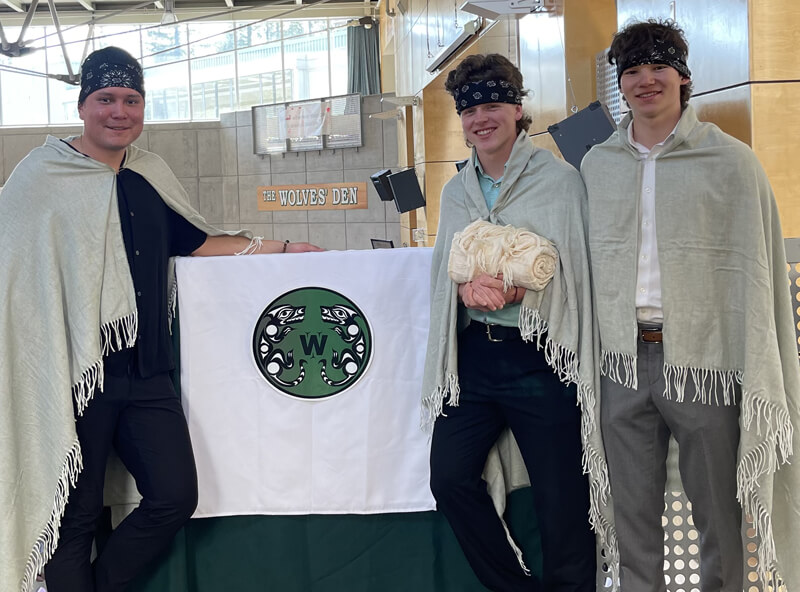We have great minds in our own communities
Deborah Jeffrey is the Executive Director of the First Nations Education Steering Committee (FNESC) and a member of the Lax Kw’alaams First Nation with deep roots in the north coast. As the third oldest of 10 siblings, she has always been a teacher.
Jeffrey brings a long view on the transformation of Indigenous education in the province. She spent 14 years as a teacher in the public system before achieving her Master of Education. Following a term as tribal council president, Jeffrey went back to law school and was called to the bar in 2008.

In 1993, Jeffrey was involved in the creation of B.C. First Nations Studies 12 – the first Indigenous-specific course offering for the B.C. public school system. She also oversaw the course’s certification as equivalent to Social Studies 12 through the BC Teachers Federation Task Force from 1997-1999.
Jeffrey recalls how English First Peoples 12 was born through jurisdiction talks with the Province. “We were at the negotiation table, and we said, “Why do our kids have to learn Shakespeare? We also have great minds, in our own communities. And our kids, well, all kids in the province need to have exposure to them.”
The enrollment never took off.
Despite the course being supported by a strong set of teaching resources and available to schools and districts for 30 years – enrollment levels in English First Peoples 12 and newer courses like BC First Peoples 12 remain quite low. Of the more than 38,000 students graduating in 2022, less than 17% had taken any Indigenous-specific courses.
FNESC undertook informal analysis and saw that the course simply wasn’t offered in most districts.
Jeffrey says “The enrollment never took off. And I think that just speaks to racism and Indigenous curriculum being viewed as less than.”
A north shore school gets an early start.
In 2022, a year ahead of the new graduation requirement coming into effect, the leadership team at Windsor Secondary School replaced English 11 with English First Peoples 11. Principal John McGowan says that teachers at Windsor were excited about the Ministry of Education and Child Care announcement because “it gave us the right leverage to do the work that we always wanted to do.”
However, McGowan said he encountered resistance from a few parents.
“No one is going to come right out and say it. Instead, it comes in the form of ‘Yeah but will my child get into university without traditional literature and composition?’ I found the best way to respond is respectfully and objectively. The fact is that this is a new graduation requirement in B.C., and your child won’t get into university without it.”
Principal McGowan takes issue with the word mandatory though. “I think for people who are critical, often the word mandatory means something that’s being done to them. When we looked at the new graduation requirement, we heard that we needed to embed a course where students experience, are exposed, and become more knowledgeable, about Indigenous education, rights, and history. I think it’s the role of public education to prepare students for the world they live in.”
He doesn’t think that the implementation of the requirement across the province will be easy though. That’s because many teachers and administrators are afraid of doing the wrong thing while trying to do the right one.
The principal becomes the student.
Recently, during a visit to Lil’wat territory, Principal McGowan encountered his own fear of failure “We made these salmon sticks for barbecuing salmon. And for me, I was worried what if I do this wrong? What if the hole isn’t deep enough? What if I make mistake? Why do I do if I break the stick? And the instructor said- ‘If the stick breaks you make another stick, or you fix a stick.’”

That the instructor would not interfere while he was struggling but merely walked beside him was frustrating and made McGowan feel vulnerable, but it was also a bit of an a-ha moment.
“This fear around mistakes is very much a Western construct. I guess the first thing you have to do – and I know it’s easy to say and hard to do – is you have to be willing to make a mistake.”
Windsor Dukes meet the Windsor Wolves
Embedding English First Peoples 11 a year early is only one piece of the school’s larger reconciliation pathway. Principal McGowan explains that that the time felt right to update the school logo and name too.
“Windsor is home of the Windsor Dukes, which is a very much a part of colonial architecture. We knew we needed to change, and we knew we could not take a pan-Indigenous approach.”
Through working closely with Tsleil-Waututh Nation, the Windsor Wolves were born.
Windsor students Kai Earl Thomas and Koji Kasubuchi presented the concept to Chief and Council and got unanimous blessing to use the wolf. Tsleil-Waututh Nation artist Jonas Jones designed the school’s new logo.

Whonoak (Dennis Thomas) is an Alumni of Windsor Secondary and an Elected Councilor for Tsleil-Waututh Nation, he says “The Wolf represents who we are as Tsleil-Waututh People, a reflection of unity, pride, and supporting one another. It was such an honor to see this journey of reconciliation be driven by two non-indigenous students. It shows strength and spirit that our society wants to be allies with our Nation as we move together and create welcoming spaces for student to learn of our deep connection to these lands. I raise my hands to the Windsor community for taking this important step.”
Districts encouraged to work with First Nations
The partnership between Tsleil-Waututh and Windsor illustrates the power of relationships in this work.
Jeffrey says she is excited to see how districts will develop their own courses to satisfy the requirement – in collaboration with local First Nations. “It has to be a co-developed course, with the First Nations on whose territories, the district operates schools. And so, we’re really hoping through that mechanism, we’ll see more and more localized content, we’ll see First Nations priorities in the provincial curriculum at the local level.”
Accountability and doing the work.
Reflecting on this moment 30 years into the journey, Jeffrey says that “The Declaration on the Rights of Indigenous People Act Action Plan has been an accelerant and an accountability mechanism. Because now you have to report annually to the legislature, and to the public of British Columbia about what you’re doing and what you’re not doing.”
She explains that accountability has been missing from past strategies, plans and projects. She says that newly established policy and legislative tables for K-12 and advanced education are finally giving Indigenous Education the platform that they deserve.
Jeffrey also views the new grad requirements as an important equity and anti-racism strategy. “When I think of racism in this country and how people are treated, it’s heartbreaking. So, what better anti-racism strategy than through education. If we have the population of British Columbia better understanding what our rights are, perhaps we don’t have to go to court so often. As we move forward implementing the standards in the Declaration Act and the alignment of laws, the best way to change that narrative is through the education of young people, not just ours, but all.”
Principal McGowan agrees and encourages other non-Indigenous people to learn, grow and find their way. “As I moved into educational leadership, I felt I had a responsibility, as an educational leader, but also as a person, as a Canadian. I couldn’t change the past. But I could change the present and the future, through my actions. I try not to get into it with people about, ‘well, that wasn’t my fault. That wasn’t my thing, right?’ I just look at it in this way – I can control the present. And by controlling what I do in the present, I do have an influence on changing the future.”
“Why do our kids have to learn Shakespeare? We also have great minds, in our own communities. And our kids, well, all kids in the province need to have exposure to them.”
Deborah Jeffrey
